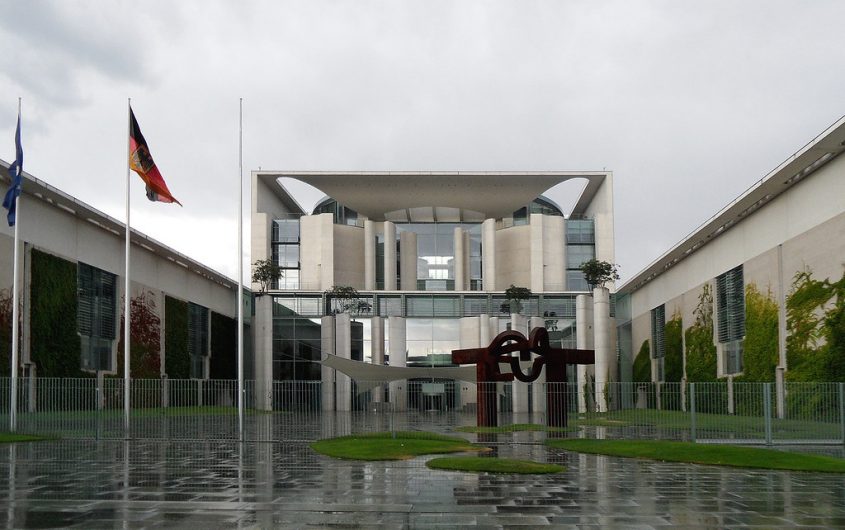
onnola via Flickr
Germany’s China and Russia Policy in the Election and Beyond

Stephen F. Szabo
Senior Fellow
Dr. Stephen F. Szabo is a Senior Fellow at AICGS, where he focuses on German foreign and security policies and the new German role in Europe and beyond. Until June 1, he was the Executive Director of the Transatlantic Academy, a Washington, DC, based forum for research and dialogue between scholars, policy experts, and authors from both sides of the Atlantic. Prior to joining the German Marshall Fund in 2007, Dr. Szabo was Interim Dean and Associate Dean for Academic Affairs and taught European Studies at The Paul H. Nitze School of Advanced International Studies, Johns Hopkins University. He served as Professor of National Security Affairs at the National War College, National Defense University (1982-1990). He received his PhD in Political Science from Georgetown University and has been a fellow with the Alexander von Humboldt Stiftung, the Woodrow Wilson International Center for Scholars, and the American Academy in Berlin, as well as serving as Research Director at AICGS. In addition to SAIS, he has taught at the Hertie School of Governance, Georgetown University, George Washington University, and the University of Virginia. He has published widely on European and German politics and foreign policies, including. The Successor Generation: International Perspectives of Postwar Europeans, The Diplomacy of German Unification, Parting Ways: The Crisis in the German-American Relationship, and Germany, Russia and the Rise of Geo-Economics.
The new German government will have to revise and reshape the legacy of the Merkel era on Russia and China policies. It will have to balance the economic interests of a geoeconomic power with concerns with values and the new strategic challenges posed by these two illiberal states. It will have to find an interparty consensus between three parties with often conflicting views led by a team with little foreign policy experience.
Very soon after the new German government took office, it had to deal with the second Ukraine crisis caused by Putin. It also faced an ascendant and illiberal China, its largest market, and a wavering and uncertain America. At the same time, the European Union has been weakened by Brexit and divisions between liberal and illiberal states. The new traffic light coalition of the Social Democrats (SPD), Liberals (FDP), and Greens offered the possibility of new approaches to these external shocks. It also confronted a new set of global issues, including climate change, migration, and major global health challenges, just to name a few. Russia posed a renewed old threat while China brought into question the German geoeconomic approach and reopened the discussion of a value-based foreign policy.
During the negotiations for the coalition agreement, the SPD emphasized realism and the need to continue to defend German interests in relations with China and Russia. The Greens and the Liberals, in contrast, wanted to emphasize a value-based foreign policy and represented a less accommodating approach to both China and Russia. Given the role of Chancellor Olaf Scholz in the previous government, he clearly wanted to continue the policies pursued by that government with only slight modifications. The Greens have long been opposed to the Nord Stream 2 gas pipeline and favored a more critical approach to human rights.
Russia Policy
The new team had very little foreign and defense policy experience when it took office. The Foreign Ministry went to the Greens and the first woman foreign minister, Annalena Baerbock, with the SPD leading both the chancellor’s office and defense ministry headed by Christine Lambrecht, a former justice minister with little security policy experience. The chancellor came to office with very limited experience in dealing with Russia, in sharp contrast to his predecessor, and was pulled between a younger generation of Social Democrats who came of age in the Putin era and take a tougher line on Russia and the older generation shaped by Ostpolitik and the Steinmeier approach of a strategic partnership.
As the Ukraine crisis worsened, divisions within the current German government became clear. The Social Democrats and their chancellor have raised doubts that they are up to the historic challenge presented by Putin’s Russia. After a promising beginning with Chancellor Olaf Scholz declaring a Zeitenwende, there has been backtracking and a lack of leadership. While announcing a major increase in defense spending, Scholz also stated that NATO should avoid a military confrontation and that the conflict could lead to a nuclear war, something only Putin and his foreign minister have raised but which provides a rationale for not provoking Russia. Polls show that the public understands that Germany has to dramatically strengthen its military and should be sending heavy weapons to Ukraine. The SPD’s coalition partners, the Greens and the Free Democrats, have been calling for a strong role and for standing up for not only German interests but for the larger West. Yet Scholz and the SPD continue their narrative of not wanting to contribute to an escalation, the exact reasoning Putin has been counting on.
At the beginning of the war, there was a case to be made that having a center-left government initiate these changes was better than a center-right alternative as it would broaden the base of support for a major strategic change. This is the Nixon to China argument, and it seemed credible given that it was a Red-Green government led by Gerhard Schröder and Joschka Fischer which took Germany into the Kosovo war and helped to legitimize a German military role among a pacifist public. However, it is becoming clear that the Social Democrats may be too divided to follow through on Scholz’s declaration, resulting in a split government. This raises questions about whether this coalition can hold and deliver the leadership Europe needs or whether a new government of national emergency consisting of the Christian Democrats, Free Democrats, and Greens should replace the flailing Scholz team.
China: The Merkel Legacy of Wandel durch Handel
China is the other challenge that will dominate the agenda of the new government. Almost all key policy challenges facing the Scholz government will have a China dimension from climate, 5G technology, human rights, intellectual property rights, cyber hacking, and Chinese investment and acquisitions in Germany and Europe to Chinese sharp power measures. On the geopolitical side, China’s expanding territorial demands in the South China Sea and beyond will also test a Germany which has not been involved in strategic questions in Asia and is not part of the AUKUS coalition being shaped by the United States in the region.
The MERICS think tank on China characterized Germany’s China policy during the Merkel years as one which shifted from a values-oriented approach to a commercially-driven one. During the Merkel years, China emerged as Germany’s largest trading partner but also increasingly as a competitor. German business labeled it as a “strategic competitor” in an important report issued by the Federation of German Industries in 2019. As is the case with Putin, the Xi government placed growing strains on the relationship.
During the election campaign, all three parties which eventually formed the new government came to a tougher line on China than Merkel’s. They devoted more attention to China in their coalition agreement than the three previous governments combined and referred to the “systemic competition” that Germany now was engaged in with the PRC. This is in contrast with the agreement eight years earlier which referred to China as a “strategic partner.” All three supported condemning China’s human rights violations and preserving Hong Kong’s autonomy as well as more Europe-wide protections, such as the 2019 EU investment-screening mechanism, which aimed to prevent foreign enterprises from buying up strategic industries.
Given the role of Chancellor Olaf Scholz in the previous government, he clearly wanted to continue the policies pursued by that government with only slight modifications.
A key question will be how China policy is formulated in the new government. While the SPD holds the Chancellor’s Office, its vote total and margin of victory were so small that it does not have the political weight that Merkel had with her larger vote totals. Scholz prefers a more pro-business stance and continuity in China policy, while both the Greens and the Liberals were proponents of a more value-based approach.
The policy of the new government took an early tougher line on China than its predecessor. The new China Strategy being drafted by the Foreign Ministry as characterized by a government spokesperson will consider “China as a partner, a competitor, and a systemic rival.” It is likely to emphasize a comprehensive European China strategy which will broaden to an Indo Pacific perspective and not just a China focus. It has emphasized European strategic sovereignty, especially regarding technology security risks as well as supporting a common European front to Chinese actions. The Green Minister for Economics and Climate Protection, Robert Habeck, made it clear he wants to strengthen the position of German companies in their competition with Chinese companies and to lessen German dependence on supply chains with China. He is planning an initiative at the G7 meeting which Germany chairs in 2022 to develop a western alternative to China’s New Silk Road. The Liberals, who control the finance, education, and science ministries, will play a role in shaping research and innovation cooperation.
A key question concerns the role German business, especially the automobile industry, will play in shaping policy for this government. The CEOs of Volkswagen and Siemens early on made their concerns known to the new Chancellor and some members of the business community have criticized Foreign Minister Baerbock.
As the new government settles in, it will face important decisions on China. The EU China Investment Agreement which Merkel and Macron tried to push through met substantial opposition in the European Parliament and is something Scholz wants, but with what modifications? How will it balance its desire to Europeanize China policy with more specifically German constraints? Will it bring German business along with a tougher approach? How will it keep close to the United States despite German concerns about a too confrontational American approach?








